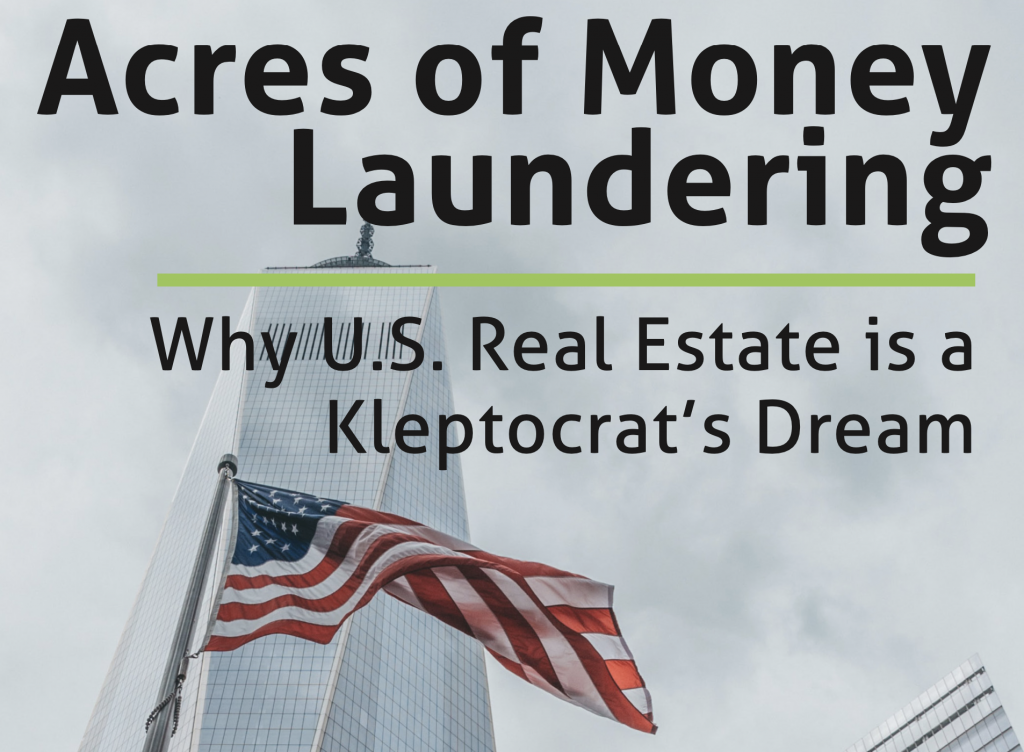What do the Iranian government, a fugitive international jeweler, and a disgraced Harvard University fencing coach have in common? They have all used U.S. real estate to launder their ill-gotten gains. In Acres of Money Laundering: Why U.S. Real Estate is a Kleptocrat’s Dream, Global Financial Integrity (GFI) dives into the murky world of global money laundering and demonstrates the ease with which kleptocrats, criminals, sanctions evaders, and corrupt government officials choose the U.S. real estate market as their preferred destination to hide and launder proceeds from illicit activities.

To tell the story of why U.S. real estate continues to remain a favored destination for illicit activity, GFI built a database of more than 100 real estate money laundering cases from the U.S., UK, and Canada, reported between 2015 – 2020. The database and accompanying regulatory analysis in this report provide conclusive evidence that the current U.S. regulatory approach, using temporary and location- specific Geographic Targeting Orders (GTOs), has critical shortcomings that will require comprehensive reform before it can adequately address the threats to the U.S. financial system and national security. To provide context to the analysis and recommendations in this report, GFI compares the regulatory developments in the U.S. with ongoing practices, challenges, and developments in the rest of the G7. Analyzing the problem in the U.S. through this prism helps the U.S. see the merits and demerits of possible regulatory approaches in other similarly placed economies and lends weight to GFI’s final recommendations. At the same time, this approach underscores the continued relevance of real estate money laundering as a systemic risk across the G7 and the need therefore for solutions that are more cooperative.
GFI’s key findings on the U.S. include:
- At a minimum, from cases reported in the last five years, more than US$2.3 billion has been laundered through U.S real estate, including millions more through other alternate assets like art, jewelry, and yachts;
- Gatekeepers including attorneys, real estate agents, investment advisers, and employees of financial institutions have repeatedly facilitated REML by high net-worth individuals through willful blindness or direct complicity, yet the U.S. remains the only G7 country that does not require real estate professionals to comply with anti-money laundering (AML) laws and regulations;
- 60.71 percent of U.S. cases involved properties in one or more non-GTO counties, demonstrating the limitations of this location-specific regulatory tool;
- Well over 50 percent of the reported cases in the U.S. involved politically exposed persons, which is particularly problematic considering the lack of guidance from FinCEN on PEP identification;
- While commercial real estate featured in more than 30 percent of the cases and generally had significantly higher values than the residential real estate involved, the U.S. is yet to create any reporting obligations for risks in the sector;
- The use of anonymous shell companies and complex corporate structures continues to be the number one money laundering typology. Eighty-two percent of U.S. cases involved the use of a legal entity to mask ownership, highlighting the importance of implementing a robust beneficial ownership registry under the Corporate Transparency Act.
KEY RECOMMENDATIONS
GFI proposes the following key recommendations for the U.S. real estate sector in line with international best practices and regulatory developments seen elsewhere in the G7:
- The GTOs, through a new rule-making, should be made permanent, expanded nationwide, and without any dollar threshold;
- Real estate agents should be required to identify the beneficial owner of a residential real estate purchase, when title agents are not involved in the transaction;
- FinCEN should issue guidance, red flag indicators, and create reporting requirements for real estate money laundering typologies related to commercial real estate transactions;
- Legal professionals should be made the lead reporting entity for identifying money laundering risks in commercial real estate transactions;
- The U.S. should create robust AML/CFT processes targeted at the real estate sector, including but not limited to a risk-based approach identifying and verifying the source of funds and beneficial owner of the client;
- FinCEN should issue guidance on the definition of PEPs and an advisory highlighting the risk of foreign PEPs to real estate money laundering schemes. Reporting entities should be required to report when a foreign PEP purchases property;
- Investment advisors should be required to carry out client due diligence, including enhanced client due diligence where required, on all prospective investors in private (real estate) funds;
- The U.S. should undertake comprehensive gatekeeper reform for the real estate sector, by lifting the exemption given to real estate professionals under the BSA and include real estate agents and legal professionals who are involved in real estate transactions under the definition of ‘financial institutions’;
- The EB-5 visa investor program needs critical reform on the methods used to identify the source of funds and verify investor identity, including processes to record investors that are PEPs.

